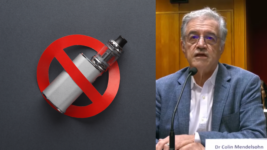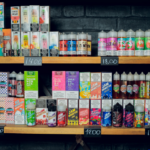Government Vaping Prohibitions Are Making Cigarettes the Easier Alternative

“The fact is they are vastly safer than smoking, and what I am here to say is, we need to stop this black market,” Dr Colin Mendelsohn told a NSW vaping inquiry last week.
“We are not going to stop it by enforcement and policing. We are only going to stop it by changing to a legal, regulated model.”
Mendelsohn, the founding chair of the Australian Tobacco Harm Reduction Association (ATHRA), made these comments during a 12 April hearing of the NSW Legislative Assembly Committee on Law and Safety inquiry into E-cigarette regulation and compliance in NSW.
The inquiry, as its chair Labor MLA Edmond Atalla explained, comes on the back of recent cases of teens being “hospitalised over nicotine poisoning”. And it’s taking place a year after federal health minister Mark Butler launched a nationwide war on vaping at the National Press Club last May.
However, the doctor, whose been working in the tobacco reduction sector for 30 years, asserts that vaping, which appeared as a harm reducing alternative to smoking, continues to hold clear benefits for people quitting smoking, and, as for nonsmokers who take it up, it’s still the healthier choice.
And since the federal government applied a ban on the import of single-use vapes at the turning of the year, at least two police officers considered it reasonable to assault a 13-year-old boy over his sucking on some vapours whilst standing next to his mother in a mall in the NSW town of Deniliquin.
An avoidable crisis
Atalla explained at inquiry commencement that its purpose is to assess the situation with vaping in NSW, as the federal government moves to implement a prohibitive set of laws that are designed to eradicate the use of these devices, without a prescription, and to deal with the black market.
Dr Mendelsohn told the five member committee that “Australia’s vaping policy is driven by valid concerns about harm to young people”, but harms such as these are minimal when compared to the reduction in cases of smoking-related deaths and disease that the practice results in.
However, reports regarding six teenagers presenting to Sydney hospitals over a nine day period last June, apparently due to high levels of nicotine, have served to demonise vaping to the point that the government is attempting to eradicate it almost completely.
The issue unfolding here, as Mendelsohn explained, is that Butler’s crackdown on vaping is setting in motion an approach that mirrors that of the war on drugs, which, as is commonly understood, has failed, and this approach, as is already being evidenced, will rather escalate harms.
Indeed, the so-called vaping crisis, which involves an increase in youth use, is a result of Australia having treated it with suspicion since the mid-2000s, and rather than improve things, restrictions have meant nicotine vapes have become less accessible to adults, yet more available to kids.
Banishing the treatment
Despite the first tranche of Butler’s war on vapes being in place and the second stage awaiting approval, no one is seriously disputing the benefits of vaping when it comes to quitting smoking. And yet, while vaping is 95 percent safer than smoking, the popular perception is now otherwise.
Instead, the campaign against vaping has focused on youth access. And this is despite NSW, and other jurisdictions, having placed a limit on retail sales to persons under 18 years old, with the law in this state having been enacted in 2015.
Section 22 of the Public Health Tobacco Act 2008 (NSW) makes it illegal to sell e-cigarettes or vapes to people under 18, via threat of a $11,000 fine for a first time offender and a $55,000 fine from then on and for businesses that offend the fines are $55,000 and $101,000 respectively.
Dr Mendelsohn told the inquiry members that the current focus, which is about to result in restrictions upon all nonprescription retail vaping sales, is not the answer, and rather it should be legalised and regulated like alcohol and tobacco.
But if this is the case, then why aren’t current age restrictions on sales working?
Well, a 2009 ban on sales of vapes containing nicotine was enacted, which meant legal sales have since comprised of nicotine-free vapes, while a huge black market selling illegal imported nicotine and nicotine-free vapes has developed, and, as Mendelsohn advises, is run by organised crime.
The issue at point-of-sale is, while a person serving in a corner store is going to check ID when required in regard to legal vaping products, they’re hardly going to check when they’re selling an illegal product from under the counter, as the entire interaction is unlawful regardless.
And following on from this, the Therapeutic Goods Administration rescheduled nicotine vaping liquid, which saw it made a prescription-only substance in October 2021, and an accompanying severely punished ban on the importation of the substance without a script was also enacted.
So, in December last year, minors could buy any illegal vaping products, containing nicotine or not, while a law-abiding adult trying to quit smoking with the aid of nicotine vaping liquid was required to go to a doctor to obtain some, even in those desperate late-night moments, it would seem.
The federal crackdown
“Is vaping a health crisis? Absolutely not? It’s perceived and promoted as a health crisis,” Mendelsohn told the inquiry members. “What’s a health crisis is that 20,000 Australians are dying every year from smoking. That is a health crisis.
“No one has ever died from vaping nicotine,” the doctor continued, “that’s in 20 years.”
But despite the stark difference between a perceived crisis and actual harms, Butler succeeded in seeing a nationwide prohibition on the importation of single-use vapes come into effect, regardless of any nicotine content, on 1 January. And as of March, it applied to reusable recreational vapes.
And just like the war on drugs, weeks later, the health minister and an Australian Border Force officer were photographed posing with a large seizure of illicit single-use vapes, and just as is the case with illegal drugs, one seizure means dozens more made it through for illegal distribution.
The Therapeutic Goods and Other Legislation Amendment (Vaping Reforms) Bill 2024 contains Butler’s second tranche of vaping law, with its main thrust being a range of new penalties and restrictions that are set to remove all recreational vaping products from the market.
Recruiting new smokers?
A 19 April statement from all Australian health ministers was issued on Friday afternoon, which outlined their support for the coordinated action being taken by the federal government against vaping in regard to young people, and they urged that Butler’s new laws be in place by 1 July.
The ministers appear to consider that vaping is being marketed not as an alternative to smoking, and an aid to quitting cigarettes, but instead, see the devices as being used as a means to recruit a new generation of nicotine-dependent people, who will ultimately turn to smoking.
So, it would seem the device that a decade and a half ago was being heralded as a cure for smoking, is now being considered by all Australian governments as a means of keeping communities addicted to nicotine and eventually, moving on to smoking.
But when Atalla put that scenario to Mendelsohn, he rejected it outright. “Vaping overall is diverting young people away from smoking,” the doctor insisted. “It is actually a gateway out of smoking.”
“As vaping rates go up in populations, and we see this in most countries, smoking rates accelerate downwards,” Mendelsohn further explained of successes elsewhere around the globe.
“So, vapes and cigarettes are substitutes.”







